Reunions of Former Inpatients on a Psychiatric Unit
Abstract
In this study, despite any negative results, the authors found that patient reunions can be structured in an appropriate way. The overall impact on both inpatients and returning former inpatients seemed to be helpful and to promote personal growth. The staff membems felt very positive about the reunions, and the reunions thus seemed to minimize staff burnout in an otherwise very stressful job. The possibility of patients' causing harm to each others' treatment programs exists, but it can be minimized to an extent by screening high-risk invitations and by close staff supervision of the reunion.
We conclude that if the theoretical and logistical issues of holding reunions of former inpatients are dealt with in advance, the constructive potentialities outweigh the destructive elements. We feel that our experience is neither unique nor idiosyncratic and that much themapeutic benefit can result from such reunions. Further research will be needed to assess the overall impact of patient reunions and to evaluate the transferability of our findings to other settings.
Access content
To read the fulltext, please use one of the options below to sign in or purchase access.- Personal login
- Institutional Login
- Sign in via OpenAthens
- Register for access
-
Please login/register if you wish to pair your device and check access availability.
Not a subscriber?
PsychiatryOnline subscription options offer access to the DSM-5 library, books, journals, CME, and patient resources. This all-in-one virtual library provides psychiatrists and mental health professionals with key resources for diagnosis, treatment, research, and professional development.
Need more help? PsychiatryOnline Customer Service may be reached by emailing [email protected] or by calling 800-368-5777 (in the U.S.) or 703-907-7322 (outside the U.S.).



